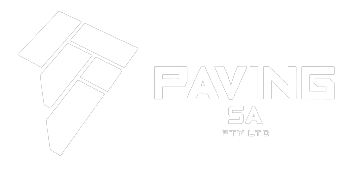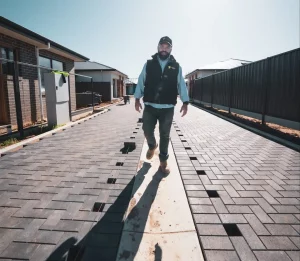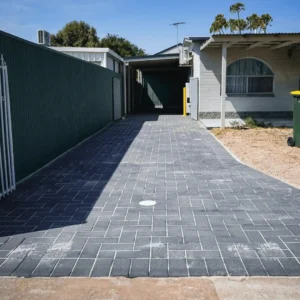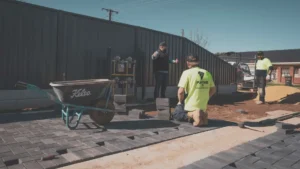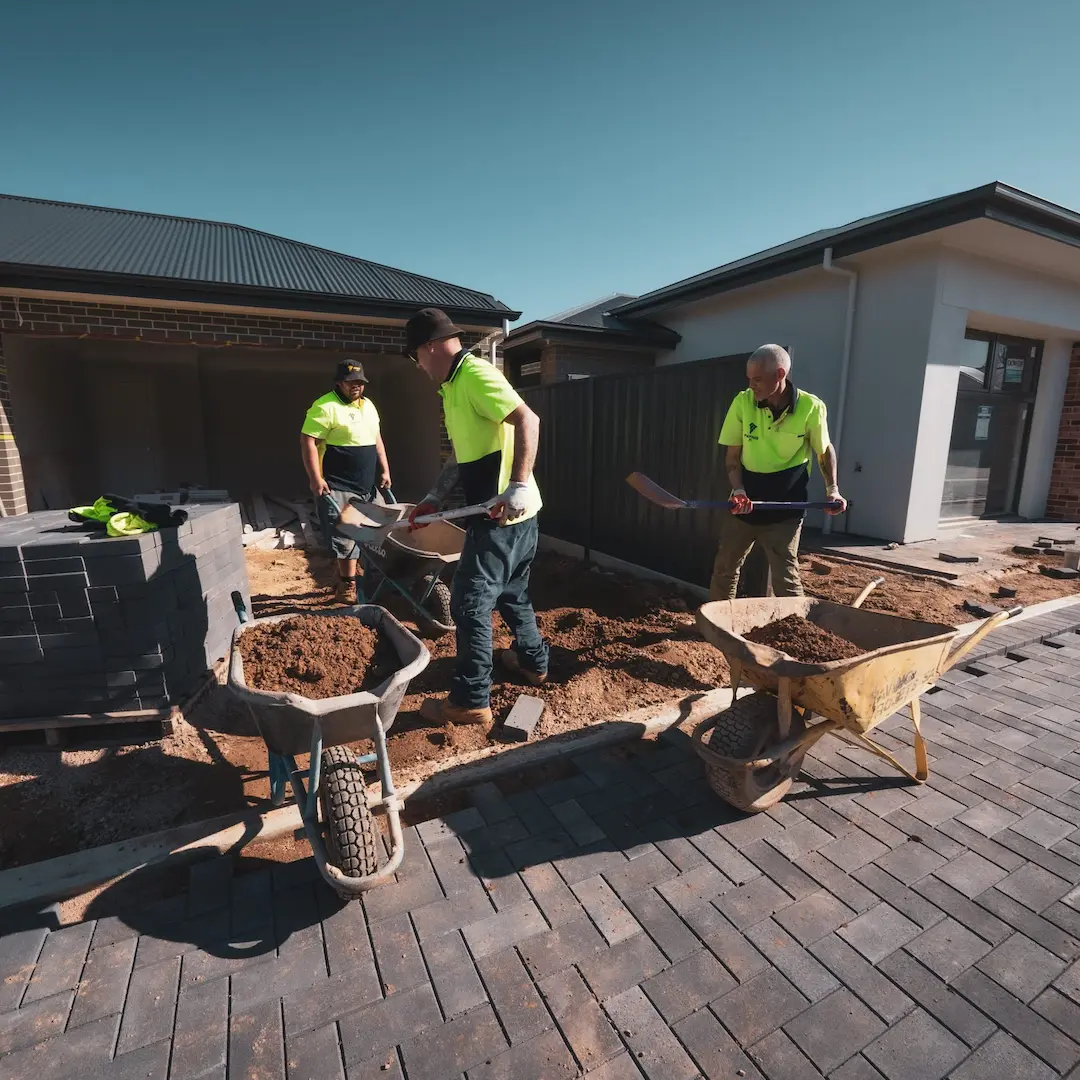In 2024, the cost of paving can fluctuate depending on several factors including material selection, labour charges, and the complexity of the project. This article is designed to guide you through understanding these variables as well as provide comprehensive insight into the total costs associated with paving.
Key Takeaways
- The cost of paving in 2024 is influenced by factors such as material choice, labour costs, project complexity, and size, with material costs ranging from $30 to $100 per square metre depending on the type.
- Labour costs for paving typically range from $25 to $70 per square metre, affected by project complexity and regional differences, and additional expenses like site preparation and base materials can significantly impact the overall budget.
- Strategic methods to reduce paving costs include choosing cost-effective materials, planning purchases during off-peak seasons, performing some preparatory work yourself, and obtaining multiple detailed quotes from local contractors.
Understanding Paving Costs in 2024
Embarking upon a paving project invariably raises the question, “What is the cost of paving?” Determining this isn’t quite simple due to various influencing elements. Factors shaping the overall costs include:
- The materials selected
- Labour charges
- Project intricacies
- Scope dimensions
Your selection of material—be it concrete pavers, brick payers or natural stone—plays a significant role in determining your total paving expenses. Concrete might present as a more economical choice, whereas natural stone often lies on the higher end of pricing. Labour costs can vary greatly based on regional variations and how complex your specific project may be. Additional hidden expenditures such as site preparation and extra materials are aspects that could unexpectedly inflate costs.
Understanding these factors aids in accurate budgetary allocations and helps prevent unanticipated fiscal burdens during the course, providing clear expectations for better strategic financial planning throughout your paving endeavour.
Cost per Square Metre
Paving materials display a broad spectrum of prices per square metre, which are crucial in determining the total expense of your paving project. The cost for these materials can start from as low as $30 to $60 or even exceed this average, reaching up to $40 to $100 per square metre for top-tier options. Economical choices like plastic pavers might only set you back around $3 to $5 per square metre, while higher-end brick pavers could impose costs between $50 and $100 per square metre depending on the sophistication and quality of material used.
In calculating the aggregate cost, it is essential to account for both labour charges and material costs. As an illustration, employing 500 X 500 X 30mm size pavers usually incurs a price ranging from approximately $50 to $60 per square metre plus additional sealant fees that may lie somewhere between $10 and $15 per square metre.Laying out expenses by squares and en sible targets for funding and the ability to make informed decisions when selecting suitable materials for the project at hand.
Labour Costs
Another critical aspect of the total costs involved in a paving project is labour expenses. The rates for labour to install pavers typically span between $25 and $55 per hour, which can fluctuate based on how complex the work is and where it’s being performed. As such, you might find that labour charges for laying pavers fall within a range of $25 to $70 per square metre due to differing demands for expertise and time investment.
Labour charges are prone to increase when dealing with elaborate projects requiring advanced skills or when working under difficult site conditions. The complexity of patterns, uneven ground, and unique specifications all have the potential to drive up hourly wages as well as aggregate labour costs. When planning your budget for a paving endeavour, considering these possible variations is essential so that one does not underestimate the amount needed for paying workers involved in installing pavers.
Additional Costs
The total cost of your paving project is influenced by more than just the expenses for materials and labour. Ancillary costs from additional requirements can be substantial. Necessary site preparation steps such as excavating, levelling, and clearing away old vegetation or existing structures are crucial to laying down a secure foundation for the paving work but may increase the overall expenditure.
When considering base materials, their costs play an important role too. For example, if you’re using crushed rock as a base material over an area measuring 50 square metres, expect to spend between $1,500 and $1,800. Should you choose a poured concrete base instead for that same area size, that could mean paying anywhere from $2,300 to $2,800 for a poured concrete base. The investment in proper site preparation and appropriate base materials is vital not only for ensuring durability but also stability of your paved space over time.
Material Choices and Their Impact on Cost
Choosing the right material for your paving project is crucial as it significantly impacts both the final look and expense. The price points and attributes of different materials can greatly affect not only the appearance but also the overall cost involved in your project.
For those embarking on an outdoor paving endeavour, commonly selected options among paving materials are:
- Concrete pavers: which offer affordability and flexibility
- Brick pavers: providing a timeless aesthetic coupled with enduring strength
- Stone pavers crafted from natural stone like limestone or travertine: delivering an upscale finish at a higher expenditure.
Understanding the pros and cons associated with each type of material will assist you in making an informed choice that meets both your budgetary constraints and design desires.
Concrete Pavers
Concrete pavers are an excellent and economical choice for a range of paving tasks because they offer affordability along with flexibility in design. Prices for concrete pavers typically vary from $20 to $60 per square metre, which is quite cost-effective when contrasted with the expense of other materials used in paving. Their availability in numerous sizes, shades, and textures affords significant opportunities for personalization and contributes to their popularity. Grasping the specifics concerning the cost per square metre associated with concrete papers empowers individuals to make choices that are financially savvy regarding their particular projects.
Constructed to bear substantial weight, these durable concrete slabs excel as surfaces for areas receiving abundant use such as walkways or entertainment spaces outside like patios. Thanks to their sturdy nature, they offer resistance against breakage and remain intact even under harsh climatic conditions. What’s more remarkable about concrete slabs is that through stamping or texturing techniques during installation processes. You can achieve a similar look provided by higher-priced options like brick or stone, effectively granting your space an air of luxury without draining your budget significantly.
Brick Pavers
Concrete pavers are a popular option for paving due to their durability and classic charm. The cost of brick pavers typically ranges from $10 to $30 per square metre, although this can vary based on the quality of materials used as well as local availability. Brick pavers may come with a higher price tag compared to concrete ones, but they provide an ageless rustic elegance that elevates both contemporary and traditional design aesthetics.
The outstanding longevity offered by brick pavers is one of their most significant benefits. When properly maintained, they have the potential to last several decades. This aspect makes them an economically savvy choice over time. Their perpetual style coupled with enduring strength positions them as a favoured selection among property owners who prioritise not only visual appeal but also sustained viability in their investment into projects like laying brick paver pathways or patios.
Natural Stone Pavers
The expense of paving with natural stone, including options like limestone, travertine, and granite, is a reflection of their upscale allure and robustness. The cost for laying down limestone pavers ranges from $40 to $90 per square metre. These types of stones are favoured for their inherent charm and distinctive character that can substantially improve the appearance of outdoor areas. Thus investing in the cost of outdoor paving is considered worthwhile.
Flagstone pavers represent one form of natural stone paver that although pricier than some alternatives, brings considerable visual enhancement as well as enduring quality which can validate its higher price tag. This kind of materials are especially fitting when aiming for a luxurious ambiance around places such as pool surrounds or elegant patios. With an array of available choices among natural stones, there’s ample opportunity to tailor design features that enhance your estate’s value significantly.
Project Complexity and Size
The complexity and size of a paving project can greatly influence the overall cost. More substantial projects necessitate increased quantities of materials, labour, and equipment usage, which contributes to an escalation in expenses when compared to their smaller and less complex counterparts. The nature of the project, whether it’s for residential or commercial use, also affects the pricing due to variations in scale and resources needed.
When preparing budgets and plans for these types of undertakings, understanding how various factors impact costs is crucial. While larger-scale endeavours come with higher total costs, they may benefit from economies of scale that could decrease the expense per square metre. On the flip side, small-scale projects are more affordable but might not experience such reductions in costing on a per-square-metre basis.
Design Intricacy
Elaborate patterns and details in paving endeavours often lead to a substantial rise in the cost of labour and materials. Specialised tools, as well as an increased number of workers, are needed to execute complex designs involving curves and ornamental aspects. The necessity for meticulous attention to detail extends the time required for completion, consequently escalating labour costs.
These intricate configurations call for additional resources which can inflate material expenditures. Although basic geometric shapes remain economical options, opting for more sophisticated arrangements can significantly enhance the project’s aesthetic value justifying the added financial investment. It is imperative to strike a balance between the intricacy of design and budget limitations in order to achieve your intended finish without excessive spending.
Site Preparation
Ensuring proper site preparation is crucial for the longevity and resilience of a paving project. The work involved in grading and sloping the build area can affect the overall labour expenses. If the terrain is irregular or suffers from inadequate drainage, extensive preparatory measures may be required, which could considerably raise the total cost of your project.
Undertaking deep excavation, soil levelling, or stabilisation processes are essential to establishing a solid base for any paving endeavours. Such steps typically necessitate specialised machinery and extra manpower, thereby increasing expenditure. Investing in thorough site preparation not only helps avoid potential complications, but also prolongs the functionality of the paved surface you’re working on—making it an indispensable part of managing long-term costs effectively.
Estimating Your Paving Project
It is crucial to have an accurate estimate for your paving project in order to budget and plan effectively. It’s essential that you measure the area needing paving with precision and acquire comprehensive bids from contractors. Being well-informed about the extent of your project and its related expenses helps prevent unforeseen costs, contributing to a seamless implementation.
Gaining insight into the precise size of your space set for paving assists in figuring out how much material will be needed as well as estimating labour efforts involved. By securing several proposals from various local paving contractors, you’ll gain insight into prevailing market rates which aids in comparing options thoroughly so that you can select one most suitable for your requirements while managing costs efficiently.
Calculating Area
Follow this procedure to compute the space that requires paving.
- Employ a measuring tape to ascertain both the length and breadth of the zone.
- Record these measurements in metres to maintain precision.
- If dealing with non-standard shapes, segment the area into simpler geometrical forms like rectangles or triangles.
- Perform individual calculations for each segmented part.
To transform foot-and-inch measurements into square metres, multiply them by 0.0929. Grasping the dimensions of your paving project allows you to better forecast material needs and more precisely estimate its overall cost.
Getting Accurate Quotes
It is crucial to gather precise estimates from a variety of paving contractors to guarantee reasonable prices and high-quality workmanship. Demand comprehensive breakdowns in their quotes that encompass the entire scope of the project, including materials used, workforce required, and any extra services provided. Such detailed comparisons aid in discerning diverse proposals and preventing unforeseen fees.
Opt for local paving professionals to take advantage of prompter service along with faster visits for quote evaluation on-site. Verify that each estimate accounts for possible additional costs like waste removal or necessary permits so you are not caught off guard by additional expenses later on. By evaluating multiple quotations side by side, you are empowered to make an informed decision that ensures maximum value for your investment in the paving project.
Tips for Reducing Paving Costs
Reducing the cost of paving while maintaining its quality is achievable through various tactical approaches. Consider these strategies to decrease your spending.
- Opt for materials that are more affordable
- Schedule acquisitions when demand is low
- Undertake initial groundwork personally
- Utilise recycled or salvaged pavers
- Acquire supplies from nearby vendors to cut down on shipping costs
-Maintain simplicity in design aesthetics
-Purchase materials in large quantities
Employing such techniques can lead to a notable reduction in paving expenses without deteriorating the calibre of your pavement.
Off-Season Purchases
Organising your paving project during the winter or toward the end of autumn may lead to significant financial benefits. The reduced demand for paving materials and labour in these quieter seasons often translates into lower prices, as contractors are more likely to offer discounts to obtain work during these times. This offers a chance for negotiation on better rates.
Acquiring materials in this off-season period can also help diminish expenses because suppliers tend to drop their prices in efforts to clear out existing stock. Through strategic planning of when you buy your supplies, it’s possible to leverage these cost reductions, ultimately decreasing the total expenditure associated with your paving endeavour.
DIY Preparation
Embarking on the preliminary steps of a paving project by yourself can lead to substantial savings in the overall cost. Engaging in tasks like clearing out old vegetation, smoothing out the surface, and installing a suitable sub-base are achievable with some dedication and simple equipment. By taking charge of these foundational activities, you’ll be able to decrease expenses related to hiring professionals and redirect your resources towards other essential parts of your paving endeavour.
Before starting the process of laying pavers, it’s imperative to ensure that there is an adequate sand sub-base, preferably around 50mm thick. This groundwork is key for establishing a firm base which helps prevent future problems such as shifting or settling pavers unevenly. If you’re equipped with the necessary expertise and time on hand, tackling preparation work independently can effectively trim down costs while maintaining high standards for your finished pavement.
Choosing the Right Paving Contractor
Selecting a qualified and reputable paving contractor is crucial for the success of your project. Experience and expertise are key factors to consider, as they directly impact the quality of work and the contractor’s ability to handle unexpected challenges. Reviewing a contractor’s portfolio and previous projects can provide insight into their capabilities and reliability.
A contractor’s reputation can prevent potential issues such as delays or poor workmanship. Checking online reviews and customer feedback helps gauge their reliability. Additionally, ensuring that the contractor is licensed, insured, and has excellent references protects you from financial liabilities and ensures professional standards are met.
Checking Credentials
It is crucial to confirm the credentials of a contractor. Check that their licence is up-to-date and covers the work scope they will undertake. Possession of an active licence signifies compliance with regional rules and norms, confirming that the contractor has attained requisite qualifications. This approval from appropriate bodies also provides an added measure of trustworthiness and dependability in their services.
Another vital element to consider is whether the contractor has adequate insurance coverage, which serves as protection against any accidents that may occur on-site during construction activities, ensuring a professional and responsible operation by the contractor. A thorough evaluation of completed works along with soliciting feedback from previous customers can offer additional assurance about both consistency in quality standards maintained by them across projects as well as general reliability in service delivery.
Comparing Quotes
Obtaining multiple quotes from different contractors helps ensure competitive pricing and quality service. Here are some tips to keep in mind when comparing quotes:
- Look for detailed, itemised quotes that clearly outline the scope of services offered.
- Be wary of the lowest bid, as it may indicate corner-cutting or subpar materials.
- Similarly, an overly high price does not necessarily guarantee superior quality.
- Consider the reputation and experience of the contractor when making your decision.
By comparing quotes and considering these factors, you can make an informed decision and choose the contractor that best meets your needs.
By comparing multiple quotes, you can identify a fair price range for your project and choose a contractor who offers the best value for your money. Ensure that all quotes include potential additional expenses, such as disposal fees or permit charges, to avoid surprises.
Long-Term Value of Quality Paving
Opting for premium-grade paving materials and expert installation offers significant benefits over time. The upfront investment might be significant, but the enduring nature and minimal requirement for constant maintenance will reduce long-term upkeep expenses. High-quality pavers have a potential lifespan ranging from 25 up to an impressive century, contingent on their composition and how well they are maintained.
Ensuring that your paved area is constructed with superior materials and by adhering to proper installation procedures can greatly extend its longevity, thus securing sustained value. Diligent preservation practices like sealing and cleaning amplify this effect by prolonging the life of your pavers while also warding off expensive repairs down the line. Committing funds to high-end quality at the start proves economical both financially and in terms of effort as time progresses.
Durability and Maintenance
When choosing paving materials for an outdoor space, the longevity and maintenance of the products are crucial elements to consider. For instance, with appropriate care, brick pavers can endure anywhere from 50 to a century, providing exceptional sustained value. Although concrete pavers typically offer a shorter lifespan—about 25 years—they still necessitate consistent upkeep to resist wear and tear from natural elements.
To preserve both the visual appeal and structural soundness of your paved area over time, it is important to engage in regular cleaning and sealing measures. This proactive approach helps curb minor issues before they grow into larger complications. By opting for robust materials alongside diligent preservation efforts, most homeowners will be able to secure an attractive exterior that stands up well over many years.
Aesthetic Appeal
The visual appeal of outdoor paving materials is essential for improving your property’s overall appearance. Available in an array of shapes, sizes, and colours to cater to diverse stylistic tastes, concrete pavers offer a myriad of design possibilities that contribute character and aesthetic intrigue to paved spaces.
For adding sophisticated charm and strength that can increase the value of properties, selecting premium border pavers is beneficial. The capacity to craft aesthetically pleasing designs using resilient materials establishes concrete paving as a favoured option for beautifying outdoor areas.
Summary
It’s critical to grasp the multitude of elements that determine paving expenses in 2024 when strategizing and implementing an effective paving project. Ensuring you select appropriate materials, effectively handle labour expenditures, prepare the site adequately, and choose a trustworthy contractor are all pivotal steps that contribute to the final result. Investing in high-quality materials and craftsmanship will lead to a sturdy and visually appealing paved area, enhancing your property’s value. Arm yourself with insights and tactics covered in this guide for making well-informed choices that streamline achieving your objectives related to paving.
Frequently Asked Questions
How much does paving cost per square metre?
The costs of paving per square metre typically vary between $30 and $60, although they may exceed this range for high-end materials, contingent upon the type of material used and the amount of labour required.
What are the typical labour costs for paving?
The expense of labour for a paving project, which involves laying pavers, typically falls between $25 and $70 per square metre. This can lead to hourly wages ranging from $25 to $55. These costs vary based on the complexity of the job as well as geographical variations.
As you prepare your financial plan for your upcoming paving project, it’s important to take these numbers into account.
How can I reduce the cost of my paving project?
To lower the expense associated with your paving project, think about selecting materials that are more affordable. Purchasing these items when demand is low, repurposing existing pavers, acquiring supplies from local vendors, and undertaking some initial groundwork personally can all contribute to a reduction in costs.
Implementing these strategies can lead to substantial savings on your paving expenditures.
What should I look for when choosing a paving contractor?
When selecting a paving contractor, it is critical to verify their licensing and insurance credentials. Examine their previous work by reviewing their portfolio and acquire several estimates for comparison purposes.
Taking these steps will assist you in identifying the most suitable contractor for your paving project.
Why should I invest in high-quality paving materials?
Purchasing superior paving materials not only bolsters the longevity of your pavement, with life spans ranging from 25 to 100 years, but also diminishes upkeep expenses and improves the aesthetic appeal of your property, offering enduring value.
Disclaimer: The pricing discussed in this article does not represent exact pricing for Paving SA’s paving services. It is merely a general guide intended for informational purposes. For precise and up-to-date pricing, please contact Paving SA directly.
